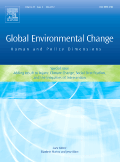
GLOBAL ENVIRONMENTAL CHANGE-HUMAN AND POLICY DIMENSIONS
Scope & Guideline
Empowering Change Through Evidence-Based Research
Introduction
Aims and Scopes
- Interdisciplinary Research:
The journal publishes research that integrates various disciplines, including environmental science, sociology, economics, and political science, to address complex environmental issues. - Human Dimensions of Environmental Change:
Research focuses on how environmental changes impact human societies, including aspects of vulnerability, adaptation, and resilience. - Policy Analysis:
The journal emphasizes studies that evaluate and inform policy responses to environmental challenges, exploring governance frameworks and policy effectiveness. - Climate Change Adaptation and Mitigation:
A significant focus on strategies and practices for adapting to and mitigating the impacts of climate change across different regions. - Sustainability Science:
Research that contributes to understanding sustainable practices and transformations in social-ecological systems, promoting long-term environmental and social sustainability. - Social Justice and Equity:
The journal highlights research addressing issues of equity, justice, and inclusion in environmental governance and policy-making.
Trending and Emerging
- Climate Justice and Equity:
An increasing number of papers focus on the intersection of climate change with social justice, highlighting the need for equitable solutions that address the disparities faced by vulnerable populations. - Integrated Approaches to Climate Adaptation:
There is a significant rise in research advocating for integrated and multi-level approaches to climate adaptation, emphasizing collaboration across sectors and scales. - Role of Indigenous Knowledge Systems:
Emerging themes include the importance of incorporating Indigenous knowledge and practices in environmental governance and climate resilience strategies. - Behavioral Insights in Environmental Policy:
A growing body of research is exploring the psychological and social factors influencing public engagement and behavior regarding climate change, contributing to more effective policy design. - Technological Innovations for Sustainability:
Papers increasingly address the role of technological advancements in facilitating sustainable practices, particularly in energy and resource management. - Transdisciplinary Research Frameworks:
There is a trend towards employing transdisciplinary frameworks that bring together stakeholders from academia, policy, and practice to co-create knowledge and solutions for sustainability challenges.
Declining or Waning
- Traditional Environmental Management Approaches:
There is a noticeable decrease in papers focused solely on conventional environmental management practices, as the discourse shifts towards more integrated and innovative approaches. - Static Climate Change Models:
Research using static models to predict climate impacts is declining, with a growing preference for dynamic, adaptive models that consider socio-economic variables. - Single-Dimensional Policy Analyses:
The journal has seen fewer studies that analyze environmental policies in isolation, moving instead towards comprehensive, multi-faceted assessments that incorporate various influencing factors. - Focus on Localized Case Studies:
While localized studies are still relevant, there is a shift towards comparative studies and broader regional analyses, reflecting a desire for findings that can inform global policy frameworks.
Similar Journals
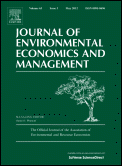
JOURNAL OF ENVIRONMENTAL ECONOMICS AND MANAGEMENT
Navigating the Nexus of Economics and Environment.JOURNAL OF ENVIRONMENTAL ECONOMICS AND MANAGEMENT, published by Academic Press Inc Elsevier Science, stands as a leading platform for scholarly discourse at the intersection of environmental economics and management. Established in 1974 and continuing through 2024, the journal targets key issues in environmental policy, management strategies, and economic implications of environmental challenges, catering to an extensive audience of researchers, professionals, and students. It boasts a prestigious Q1 ranking in both Economics and Econometrics and Management, Monitoring, Policy and Law for 2023, underscoring its significant contribution to the field. Additionally, with outstanding Scopus rankings—placed in the 88th percentile for Economics and Econometrics and the 82nd percentile for Environmental Science—the journal is recognized for its rigorous peer-reviewed research. Although it follows a subscription model, the insights gained from its comprehensive articles are invaluable for addressing today’s pressing environmental and economic challenges.
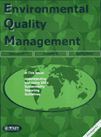
ENVIRONMENTAL QUALITY MANAGEMENT
Advancing the Intersection of Environment and HealthENVIRONMENTAL QUALITY MANAGEMENT is a respected journal published by WILEY, focusing on interdisciplinary studies that merge environmental science with public health, management, policy, and law. Since its inception in 1991, this journal has provided a platform for researchers and practitioners to share innovative insights and advancements in understanding environmental quality and its impacts on human health and the ecosystem. With an ISSN of 1088-1913 and an E-ISSN of 1520-6483, it holds a significant position in the academic community, evidenced by its presence in the Q3 quartile across several categories, including Management, Monitoring, Policy and Law, as well as Pollution and Waste Management. Although it is not an open-access journal, it continues to be a vital resource for those in the environmental sector, offering robust evaluations and discussions that advance knowledge and foster improved practices. With Scopus rankings demonstrating its relevance among other titles in the field, ENVIRONMENTAL QUALITY MANAGEMENT plays a crucial role in shaping discourse and informing policy in an increasingly vital area of study.
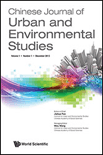
Chinese Journal of Urban and Environmental Studies
Illuminating the Path to Eco-Conscious Urban DevelopmentChinese Journal of Urban and Environmental Studies, published by World Scientific Publishing Co Pte Ltd, stands at the intersection of urban studies and environmental research, providing a critical platform for the dissemination of knowledge and innovative ideas in these increasingly vital fields. With an ISSN of 2345-7481 and E-ISSN 2345-752X, this open-access journal has been recognized for its significant contributions, achieving impressive quartile rankings, including Q2 in Urban Studies and Q2 in Geography, Planning and Development for 2023. As it converges from 2019 to 2024, the journal aims to foster interdisciplinary collaboration and to stimulate dialogue among researchers, professionals, and policymakers. With its focus on relevant socio-economic and environmental issues, Chinese Journal of Urban and Environmental Studies serves as an essential resource for anyone looking to gain insight into the complexities of urban environments and their ecological impacts, making it an indispensable addition to the libraries of those committed to sustainable development and urban planning.
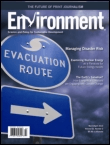
ENVIRONMENT
Shaping Tomorrow's Environmental Policies TodayENVIRONMENT is a premier journal published by Routledge Journals, Taylor & Francis Ltd, focusing on interdisciplinary studies in the field of environmental science. With the ISSN 0013-9157 and E-ISSN 1939-9154, this journal serves as a vital platform for the dissemination of high-quality research and innovative ideas that address contemporary environmental challenges. Spanning over five decades since its inception in 1969, the journal boasts an impressive impact factor and is recognized in multiple prestigious categories: Q1 in Environmental Engineering and Water Science and Technology, as well as Q2 rankings in Global and Planetary Change and Renewable Energy, Sustainability, and the Environment. Covering a diverse scope from ecological studies to sustainable technologies, it attracts a global readership comprised of researchers, professionals, and students committed to driving progress in environmental sustainability. Although currently not an open-access journal, it offers essential insights and empirical findings crucial for policy development and practical applications in the world of environmental science. The journal not only contributes to scholarly discourse but also plays a significant role in shaping future research directions and fostering a deeper understanding of the intricate relationships between humans and their environment.

All Earth
Innovating Solutions for Global Environmental ChallengesAll Earth is an esteemed open-access journal published by Taylor & Francis Ltd, dedicated to multidisciplinary research in the fields of Earth and Planetary Sciences, Global and Planetary Change, as well as Management, Monitoring, Policy, and Law. Since its inception in 2021, All Earth has swiftly positioned itself in the academic community, achieving notable rankings such as Q2 in Earth and Planetary Sciences and Q3 in related fields, showcasing its commitment to high-quality interdisciplinary scholarship. Researchers and professionals can benefit from its accessible content, which contributes to the ongoing discourse on critical environmental issues and innovative solutions for sustainable development. The journal is based in the United Kingdom and continues to be a vital source of information and inspiration for students and scholars aiming to tackle the pressing challenges of our planet through rigorous scientific inquiry and policy analysis.

International Environmental Agreements-Politics Law and Economics
Bridging disciplines to foster effective environmental policy.International Environmental Agreements-Politics Law and Economics, published by SPRINGER, is a leading journal dedicated to exploring the intersection of economics, law, and political science as they relate to international environmental agreements. With impressively high rankings in its respective categories—Q1 in Economics and Econometrics, Law, and Political Science and International Relations—this journal serves as a critical platform for rigorous scholarly discourse, addressing pressing global challenges and fostering understanding among policymakers and academics alike. The journal is indexed with an E-ISSN of 1573-1553 and maintains a strong presence in Scopus, excelling in multiple disciplines (ranked #40 in Law, #39 in Political Science, and #128 in Economics). Despite being a subscription-based journal, its comprehensive analyses and innovative perspectives make it an invaluable resource for researchers, professionals, and students committed to advancing sustainable environmental governance. Established in 2003, the journal continues to contribute to the field with engaging content that encourages interdisciplinary collaboration and furthers the study of international environmental treaties.

Environmental Policy and Governance
Shaping Tomorrow's Policies for a Sustainable FutureEnvironmental Policy and Governance is a premier academic journal published by WILEY PERIODICALS, INC, based in the United Kingdom, dedicated to advancing the understanding and implementation of environmental policy across various governance frameworks. With an ISSN of 1756-932X and E-ISSN 1756-9338, this journal spans from 2009 to 2024, reflecting a rich history of contributions to the field. Renowned for its rigorous scholarship, it holds a prestigious Q1 ranking in both Geography, Planning and Development and Management, Monitoring, Policy and Law, positioning it in the top tier of academic discourse. The journal has made significant strides in promoting interdisciplinary research, fostering dialogue among policymakers, scholars, and practitioners, and addressing pressing global environmental challenges. Although currently not an Open Access publication, its high impact factor underlines its relevance and authority, making it an essential resource for researchers, professionals, and students eager to explore innovative solutions and best practices in environmental governance.

M+A-Revista Electronica de Medio Ambiente
Advancing Environmental Knowledge for a Sustainable FutureM+A-Revista Electronica de Medio Ambiente, published by Universidad Complutense de Madrid, Servicio Publicaciones, is a leading open-access journal dedicated to advancing the field of environmental science and policy. With an ISSN of 1886-3329, this journal serves as a vital platform for researchers, professionals, and students to disseminate innovative findings and insights related to environmental issues, sustainability practices, and ecological conservation. The journal aims to foster interdisciplinary collaboration and strengthen the dialogue between academia and practitioners in addressing pressing environmental challenges. Situated in Madrid, Spain, it actively contributes to the global discourse on ecological matters, encouraging the submission of high-quality research articles, reviews, and case studies. By providing accessible and relevant content, M+A-Revista Electronica de Medio Ambiente significantly impacts the advancement of knowledge in this critical domain.

Anthropocene Coasts
Empowering Research for a Sustainable Marine FutureAnthropocene Coasts is a pivotal peer-reviewed journal published by SpringerNature, dedicated to advancing the interdisciplinary understanding of coastal systems in the context of the Anthropocene epoch. Since its inception in 2018, the journal has focused on critical issues at the intersection of Nature and Landscape Conservation, Ocean Engineering, Oceanography, and Waste Management and Disposal, achieving an impressive Q2 ranking in all these categories as of 2023. With a country of origin in Canada, this journal not only addresses significant environmental challenges, but also promotes innovative solutions and sustainable practices that resonate globally. Researchers, professionals, and students engaged in marine science, environmental studies, and engineering will find valuable insights and cutting-edge research disseminated through this open-access platform. By fostering collaboration and knowledge-sharing, Anthropocene Coasts empowers its audience to contribute to the sustainable management of coastal environments in an era of rapid change.

ECOLOGY AND SOCIETY
Empowering research through open-access collaboration.ECOLOGY AND SOCIETY, published by the esteemed Resilience Alliance, stands as a paramount open-access journal in the field of ecology, having served the academic community since its establishment in 1997. With an impressive Q1 ranking in Ecology and an Scopus rank of 77 out of 461 in Environmental Science, this journal is dedicated to advancing our understanding of the interconnectedness between human societies and ecological systems. As a pioneer of open-access publishing since 2004, it ensures that cutting-edge research is freely accessible to all, thereby promoting knowledge sharing and collaboration among researchers, professionals, and students alike. The journal fosters interdisciplinary discourse and provides a platform for innovative studies that address pressing environmental challenges, making it a vital resource for anyone engaged in ecological research and practice.